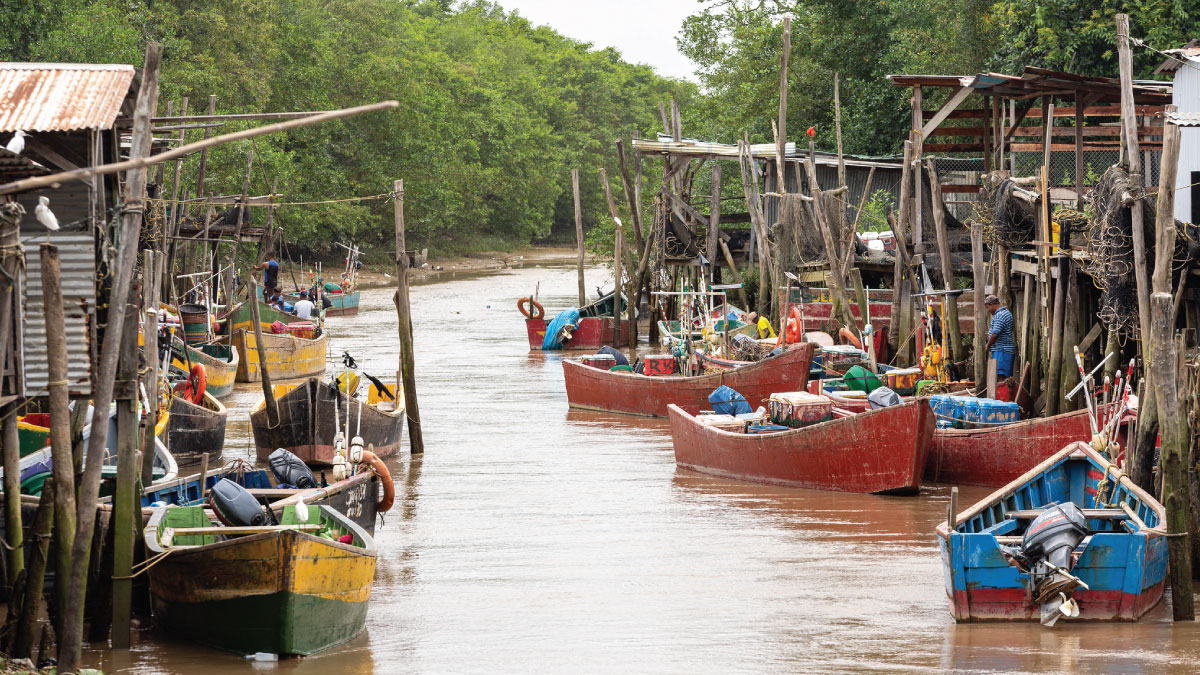By Paul Akiwumi, Director for Africa and Least Developed Countries, UNCTAD

© FAO | Fishing boats in Guyana.
Small island developing states (SIDS) have a unique geography that isolates them to a significant degree from the global economy, and leaves them vulnerable to climate change, natural disasters and various external shocks.
However, it also offers them a unique comparative advantage through their access to marine resources.
Even though SIDS have a limited landmass, they have jurisdiction over large ocean areas through their respective exclusive economic zones (EEZ), as stipulated under the United Nations Convention on the Law of the Sea.
For example, Kiribati’s EEZ which is just under 350,000 square kilometres, is over 4,300 times larger than its land area of 811 square kilometres.
It follows that the ability to sustainably utilize marine resources presents a great opportunity for inclusive development.
Potential and limits of marine bioprospecting
Marine bioprospecting is the systematic search for unique genes, molecules, and organisms from the marine environment with features that could be useful to society and/or have potential for commercial development.
While the ocean’s biodiversity offers significant economic opportunities through the discovery of novel genetic resources, it remains underexplored.
For instance, pharmaceutical, cosmetic, electronic and food industries are interested in uncovering marine compounds to help develop new innovative products.
With over 1,000 compounds being discovered just for the pharmaceutical industry each year, the future of marine bioprospecting is bright.
The ability of marine organisms to thrive in complex and harsh ecosystems makes them valuable for their antiviral, antibacterial and anti-inflammatory properties.
Very few marine compounds are used commercially, with only seven drugs approved by European and American drug agencies, most of them for cancer treatment.
Marine compounds are used in various other product categories. For example, pseudopterosins, extracted from soft coral, are used in cosmetics for their anti-inflammatory properties, and omega-3 fatty acids from microalgae can be found in food supplements.
Through bioprospecting, SIDS can generate immense value and use their natural endowments to solve pressing socioeconomic problems for more than 65 million people.
With fair access and benefit sharing, bioprospecting can help create scientific capacities and productive jobs, as well as offer opportunities for economic diversification. All of this can promote socioeconomic development and reduce vulnerabilities to external shocks.
However, despite its potential, marine bioprospecting can’t be considered an only remedy to SIDS’ developmental challenges. Nor can its management be left unattended.
Bioprospecting is extremely expensive, its results are slow and unpredictable, and it risks damaging the local natural environment.
The exploitation of marine bioprospecting should therefore be done in a sustainable manner and viewed as part of a long-term development strategy.
Legal and institutional frameworks critical
It is important to have a legal and institutional framework to provide clarity for both bioprospectors on how to access marine resource, and SIDS on how to ensure fair benefit sharing.
The Convention on Biological Diversity and its supplementary agreement, the Nagoya Protocol, outline the mechanisms to be put in place at the national level to access and share the benefits that come from the use of genetic resources in a fair and equitable way.
At a broader level, all countries should ratify the protocol and have the legal arrangements in place. This would help all countries, including SIDS, get their due share of benefits.
While international conventions entail obligations usually directed at states, users of genetic resources – including private entities such as companies and research centres – also have an active role to play.
The Bonn Guidelines, developed prior to the Nagoya Protocol, provide a list of responsibilities to be ascertained by the user that should be followed even in the absence of legislation in a provider country.
Further, as bioprospectors typically leverage traditional knowledge and practices to extract genetic resources from a national territory, benefit sharing is essential to promote local and sustainable development.
Legal frameworks can help balance the interest of different stakeholders along with a country’s policy goals. There is a long history of sharing the benefits of genetic resources. These past arrangements can be used as inspiration by SIDS when negotiating with bioprospectors.
Sustainability the way forward
As SIDS move forward to realize the potential of marine bioprospecting, it is crucial to remember that their wealth also lies in their biodiversity.
Therefore, it is important to progress in a sustainable manner, which preserves the marine environment to ensure its productivity for decades to come, and to protect other economic sectors depending on the ocean, such as fisheries and tourism.
As UNCTAD accelerates its work on helping countries build and enhance their productive capacities, it will support SIDS to sustainably develop bioprospecting as one of the viable sectors with the greatest potential to economically lift these vulnerable countries.


